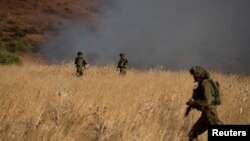Rockets hit an Israeli village near the Lebanese border on Thursday and Israel struck back in the Syrian Golan Heights, saying the rare salvo had been launched there by a Iranian-backed Palestinian militant group.
The group, Islamic Jihad, denied the Israeli allegation. It had previously threatened reprisals should one of its activists in Israeli detention, Mohammed Allan, die of a hunger strike.
Israel's Supreme Court suspended the detention of Allan, who has suffered brain damage after 65 days without food.
Israeli officials said two rockets struck close to a northern village in the upper Galilee, near the Lebanese border, setting off brush fires but causing no casualties. Air-raid sirens had sent residents to shelters.
The attack was unusual as that frontier had been largely quiet since the 2006 war between Israel and the Lebanese guerrilla group Hezbollah. By contrast, the Israeli-held Golan, some 16 km (10 miles) to the east, has occasionally come under fire from within Syria during the four-year-old civil war there.
In a statement, the Israeli military said the rockets that hit the upper Galilee "were launched from the Syrian Golan Heights ... by Islamic Jihad, sponsored by Iran".
Israel "holds the Syrian government responsible for attacks emanating from Syria", the military said, adding that it had retaliated against targets in Syria.
Syrian rebel sources said Israeli warplanes struck several of Damascus's military facilities on the Syrian Golan. They said the strikes caused casualties, but did not elaborate.
Islamic Jihad's leaders are based in the Syrian capital while the bulk of its followers are in the Gaza Strip, whose dominant faction Hamas has mostly been observing a truce with Israel that ended the war in the Palestinian enclave a year ago.
Dawoud Shehab, an Islamic Jihad spokesman in Gaza, denied that the group had fired on Israel from the Syrian Golan.
"Israel is trying to divert attention from the defeat that it suffered in the face of the determination of the hero prisoner, Mohammed Allan," Shehab told Reuters.
Allan had refused food in protest at being detained without trial by Israel. On Wednesday, he called off the 65-day hunger strike after Israel's top court suspended his arrest warrant.
The possibility that Allan might die of his fast had drawn Islamic Jihad threats to attack Israel, which in turn deployed Iron Dome rocket interceptors outside Gaza as a precaution.
Islamic Jihad acknowledges receiving support from Iran, Israel's arch-foe. Israel has sought to highlight such Iranian backing for regional armed groups as it campaigns against U.S. congressional approval of the July 14 deal curbing Tehran's nuclear project in exchange for international sanctions relief.
Israel captured the western Golan in a 1967 war and annexed it, a move not recognized abroad. While saying it is keeping out of the Syrian civil war and that some of the shooting against its side of the Golan has been stray fire, Israel has usually retaliated against Damascus's assets over the armistice line.





